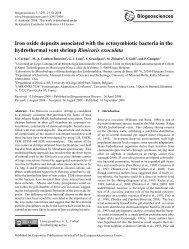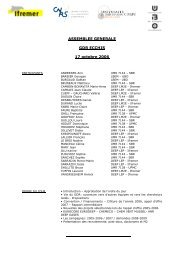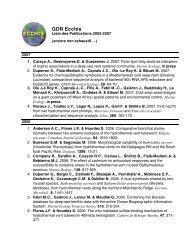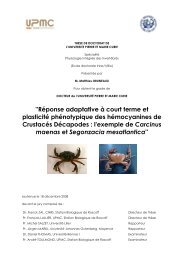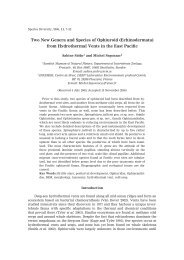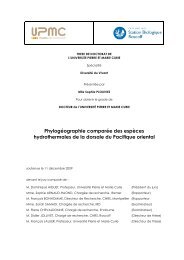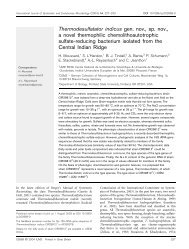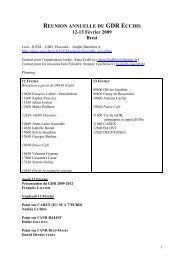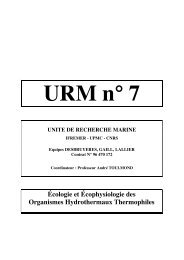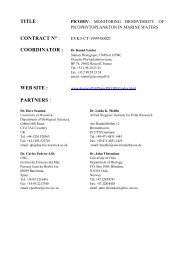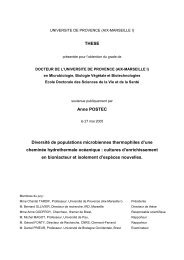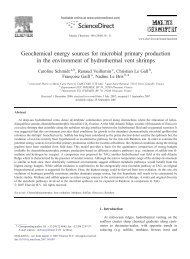European Ocean Research Fleets - uefiscdi
European Ocean Research Fleets - uefiscdi
European Ocean Research Fleets - uefiscdi
Create successful ePaper yourself
Turn your PDF publications into a flip-book with our unique Google optimized e-Paper software.
The Atlantic (essentially Gulf of Biscaye)<br />
and the Mediterranean Sea (Paris<br />
workshop, May 2004).<br />
Utilisation of available time on RVs and use of<br />
specialised vessels:<br />
– In Greece, HCMR is hiring a professional fishing<br />
vessel. HCMR owns only two RVs which are overutilised<br />
by scientists, even in the field of archaeology.<br />
The available time can be evaluated as of 10<br />
days per year.<br />
– In Portugal, the RVs currently in operation are old,<br />
but funds to replace and/or to modernise them appear<br />
to be easily obtainable.<br />
– In Spain, the RV Vizconde de Eza is being managed<br />
and operated by the General Secretariat for Fisheries<br />
which commits the IEO to various cruises.<br />
– In France, available time on the RV Thalassa, which<br />
is a multi-purpose vessel, is occupied for oceanographic<br />
cruises. No shiptime is available for the<br />
next 3 years. This is partly due to the pressure<br />
induced by <strong>European</strong> oriented campaigns (IBTS,<br />
PELGAS, PELACUS and EVHOE). Year 2006 will<br />
be particularly intense in this respects.<br />
In practice, the Greek fleet employs foreign seamen,<br />
which gives a very attractive cost for days at sea. The<br />
great variability of the running costs among the different<br />
national fleets seems to be a huge barrier to a common<br />
implementation of the fleet and a brake to transferring<br />
scientific cruises from one fleet to another.<br />
Martin Scholten<br />
President of EFARO<br />
Cost reduction and transit time restriction:<br />
– Local and regional arrangements are probably the<br />
only ones that could be efficient.<br />
– Exchange forum in order to valorise the transit time<br />
must be adopted.<br />
Common investment in new vessels and/or<br />
equipments:<br />
As funds are not trans-national, the issue is beyond<br />
their scope. This displays the fact that if there are barriers<br />
to collaboration between <strong>European</strong> countries, this<br />
is also the case within the <strong>European</strong> structure, where<br />
some tolls are provided for a better integration and to<br />
reduce overlapping when others are inducing the opposite.<br />
As a matter of fact, the only potential partners for implementing<br />
common RVs in the south Atlantic and Gulf<br />
of Biscay are Spain and France.<br />
Standardisation:<br />
Peer review procedures are very limited in other fleets<br />
than the French one. A harmonisation of scientist request<br />
for cruise is not common within the various<br />
teams that have access to the RVs. In Spain, a coordinating<br />
committee for fleet implementation was due to<br />
be organised, but has not met yet. In Greece, scientists<br />
pay a lump sum from their own budget to have access<br />
to fleet, which is not the case in France where Ifremer<br />
is in charge of covering the whole cost of implementing<br />
the fleet for the scientific community.<br />
<strong>European</strong> <strong>Ocean</strong> <strong>Research</strong> <strong>Fleets</strong> | 57



